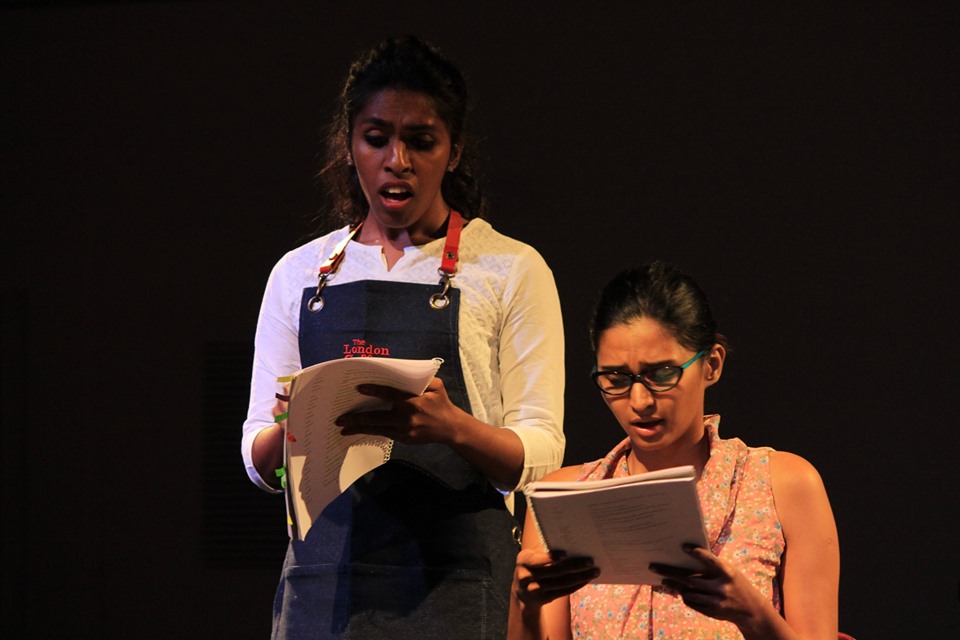Written by Stefan Wipplinger, ‘Trouser Bicycle Woman’ is a part of the German spotlight series, hosted by Goethe-Institut in collaboration with Sandbox Collective. On 11th May, directors from all over Bangalore were invited to present a dramatized reading of a German script translated to English.
Outside the auditorium, the hallway is crowded with people talking animatedly with each other, and the doors open at exactly 7 pm. At first glance, the stage resembles the storage room behind a supermarket. There are cardboard boxes strewn across the wooden platform, with packets of toilet paper and a stack of books in one corner, and at the front, a pile of clothing that makes eye contact with the audience before any of the actors do.
The four cast members are seated on chairs that surround the stage. They glance briefly at each other and the lights dim.
‘Trouser Bicycle Woman’ is a play about the search for identity and the answer to the question: what role does the possession and exchanging of objects play in everyday life? The lives of the seemingly unconnected four characters are interwoven through the things they are both unable to part with, and the things they attempt to give away freely.
First, a homeless man’s cycle is stolen. Alf and Michaela would like to have a child, but cannot. Janne is asked to be the surrogate, but refuses. She swaps apartments with Tom, and gives her heart away in the process. Throughout the course of the play, the actors use their scripts as props as they move around the stage, changing clothes and shifting positions. The changing of the scenes is backed by subtle sounds to resemble the idea of things slipping through one’s pocket, and provide the audience with a sense of déjà vu. The four actors (2 men and 2 women) play multiple roles and break the fourth wall occasionally through monologues.

As the evening progresses, the stage stops being a piece of wood and turns into a street, a home, a restaurant. Each character represents how differently human beings perceive letting go. From pairs of trousers to lost wallets, the objects in the play are never in one place for too long. “It is about how the object keeps passing from one person to another. It’s the lack of permanence, but also how people are connected through the things that they own”, says Sunayana Premchander, director of the evening’s reading.
The play closes with Tom and Janne trying to navigate their way through an unexpected circumstance that they must deal with as their relationship begins to change. Once Premchander is finished chatting with a member of the audience, she thanks each actor and photographer with a warm hug after the lights are switched on and the room empties.
‘Trouser Bicycle Woman’ was chosen because of how relatable and accessible the script was, and how the German context didn’t matter – we all have trouble with change and giving things away, and wanting to belong to something. Choosing to place piles of things around the stage was a deliberate choice, as she wanted it to represent a place in which letting go was something the characters found difficult.
Marie Kondo’s philosophy involves moving forward from objects that no longer spark joy. While Stefan Wipplinger may not have had Kondo in mind when he wrote the play, he asks his characters to assess their identities and confront the importance of letting go.
The play was read by Anoosha Krishna, Aditya Nair, Mohammed Lehry and Shilok Mukkati.
Featured image credit: Sandbox Collective on Facebook.
Amelia David
Latest posts by Amelia David (see all)
- “It all comes back”: On Reading Joan Didion - 7th July 2020
- Udupi Is Only a Five-Minute Walk from College - 16th August 2019
- #101 - 26th May 2019





